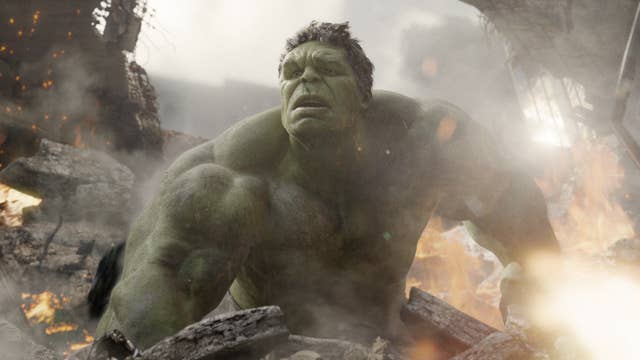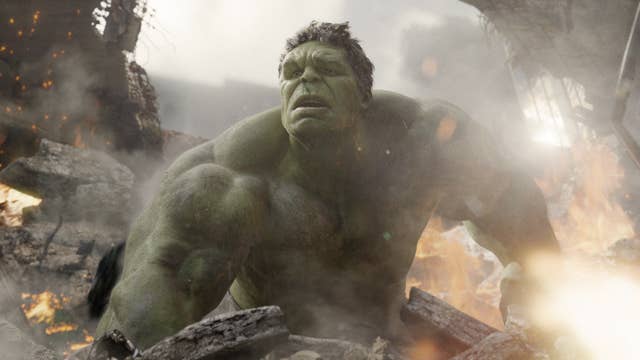
When I first saw the trailer for Thor: Ragnarok, I won't front: I was fucking ecstatic. With the Thor films being some of the worst within the Marvel Cinematic Universe, it was good to see a movie take a page from the Guardians of the Galaxy series and get a little weird. It carried an '80s action film aesthetic, a big soundtrack, and wasn't afraid to add humor into the mix. There's even an awesome Hulk cameo in it, highlighting the "different Hulk" Mark Ruffalo spoke about portraying back in 2015.
After the "new trailer" smell wore off, though, you get to thinking: "Wait, when do we get a new Hulk film?" He's clearly a part of the MCU, and is one of the fan favorites from 2012's Marvel's The Avengers, right? Sure, 2008's The Incredible Hulk was incredibly ass, but Marvel actually won when Edward Norton (who portrayed Hulk in the 2008 film) left the franchise and was replaced by Mark Ruffalo. Ruffalo plays the role of the wickedly-intellectual scientist who has to deal with harnessing an incredibly deadly power that ruminates inside of him, itching to get out. You know what else is itching to get out? Those rights to the Hulk franchise that Universal is ferociously holding onto.
In 2008, back when Edward Norton was still optimistic about the Hulk series, he spoke on there being some semblance of an idea regarding where Marvel and Universal wanted to go with the Hulk series. "To me," Norton said, "the whole thing was to envision it in multiple parts. We left a lot out on purpose. It’s definitely intended as a chapter one." During the summer of 2008, however, Hulk director Louis Leterrier doubted there'd be a sequel based on the film's box office performance (it reportedly pulled in $263 million on a $150 million budget), and was leery on essentially telling the same story twice (regarding the Hulk's issues with anger management).
In 2010, Kevin Feige (who has helped orchestrate the entire Marvel Cinematic Universe for Marvel Studios) announced that Norton was out and Ruffalo was in, based on Ruffalo being "an actor who embodies the creativity and collaborative spirit of our other talented cast members." This change made sense, considering that Marvel was moving full force towards The Avengers, which was an ensemble piece that'd bring in the likes of Captain America (Chris Evans), Iron Man (Robert Downey, Jr.), Thor (Chris Hemsworth), and a host of other stars together for one massive film (a monstrous $1.5 billion on a $220 million budget). You'd think that Universal, who still held onto the rights of the Hulk franchise, would be up for making a sequel to The Incredible Hulk, right? Think again.
During the D23 Expo, Variety caught up with Mark Ruffalo, who promptly shut down any notion of a new solo Hulk film.
"I want to just make one thing perfectly clear today," Ruffalo said. "A standalone Hulk movie will never happen. Universal has the rights, and for some reason, they don’t know how to play well with Marvel. And they don’t want to make money."
That's a pretty damn definitive statement from the guy who embodies the Green Giant within the MCU, and isn't the first time he's spoken about it. In April of 2015, Ruffalo told Collider that "as far as a Hulk movie, a standalone Hulk movie, Marvel doesn’t really have the rights to that yet. That’s still Universal’s property, so there’s that issue. That’s a big impediment to moving forward with that. Now I don’t think that’s insurmountable, by the way, but I don’t know where it’s going from here for me."
Six months later, in October of 2015, Ruffalo said the prospect of a standalone Hulk movie "feels further away" than it had before. If that's the case, how is the Hulk continuing to show up in multiple Marvel movies, right? As it turns out, while Marvel Studios owns the film production rights to the Hulk character, they got them after Universal failed to make a sequel to the underperforming Ang Lee-directed Hulk from 2003. The problem is that Universal has the distribution rights to the Hulk character, which means they are in charge of when a film is released, how it is marketed, and how many screens it will end up on. Universal also owns "the right to first refusal" on the Hulk character, which means that if they aren't fucking with a particular idea for a Hulk movie (or just want to sit on the properties they own), they can deny any projects for said character.
Now that shouldn't totally hold up a Hulk film though; it's not like Marvel hasn't worked with other production companies before. Paramount handled distribution for the first two Iron Man films, as well as the first Captain America and Thor movies. And the recently-released (and critically-praised) Spider-Man: Homecoming was a unique deal between Marvel Studios and Sony Pictures. Sony owned the rights to the Spider-Man character (thanks to making a string of weak Spider-Man films), and Marvel wanted to get Spider-Man in Captain America: Civil War. Their deal ended up throwing Tom Holland's Spider-Man into the Marvel Cinematic Universe, giving the character a fresh coat of paint for critics and allowing Sony to reap the box office rewards on Homecoming, while Marvel got paid off of the merchandising from the movie.
Why wouldn't Marvel and Universal be able to reach a similar deal? THR speculated in 2015 that it might be because Universal holds theme park rights to some Marvel characters that Marvel's parent company Disney might be after. Whatever the case may be, Marvel may have figured out how to game the system and tell a Hulk story within multiple MCU movies.
While the above clip from Variety was used throughout the news cycle as the end-all, be-all word on what's going on with the Hulk standalone film, Ruffalo dropped another quote during that same press blitz at D23 Expo.
"There's a huge change for Hulk & for Banner & it doesn't get resolved in the first #InfinityWar..." - @MarkRuffalo #D23Expo via @Fandango pic.twitter.com/LzbMtTlzZi
"There's a huge change for Hulk and for Banner," Ruffalo starts, "and it isn't resolved in the first Infinity Wars; it sort of culminates in the second Infinity Wars... but there's a lot of surprises. Beginning in Thor 3 is the beginning of a lot of changes for Banner and Hulk."
This isn't the first time Ruffalo's spoken about the Hulk being weaved throughout these Marvel properties. In a 2016 conversation with Yahoo Movies, Ruffalo said "we’ve worked a really interesting arc into Thor 3, Avengers 3 and 4 for Banner that I think will – when it’s all added up – will feel like a Hulk movie, a standalone movie."
The arc seems to be easy enough to set up, thus far. After The Incredible Hulk in 2008, we next caught up with Banner in The Avengers, where he was laying low, trying to keep the Hulk at bay until he was forced to unleash the beast to help save the planet while devastating a portion of the Big Apple in The Battle of New York. After being a horrible psychiatrist to Tony Stark, we didn't see Banner or the Hulk in the MCU until Avengers: Age of Ultron, where he went on a destructive rampage in Africa after being tricked by the Scarlet Witch. After the Hulk helped the Avengers take out Ultron in Sokovia (which was decimated in the process), the Hulk decided to take off in a Quinjet by himself, heading off into a distant land. Banner was again spotted in that awesome Thor mockumentary While You Were Fighting, but won't make his way onto screens until Thor: Ragnarok this November with an entirely different look.
While it's hard to tell how Thor ends up on the planet where he's set to do battle with their beast, the fact that the Hulk is there (and is kind of a big deal) would align with this being the Planet Hulk adaptation that had been a rumored storyline for the MCU for years. In it, the Hulk is banished from Earth and put onto a distant planet (known as Sakaar in the comics), which he ends up becoming the biggest badass on. If that's the case, this would totally explain time the Hulk from the Quinjet in Age of Ultron to Ragnarok for fans in what hopefully is a quick and dirty flashback embedded somewhere in Ragnarok. Based on what Ruffalo has said, it looks like Hulk will come out of Ragnarok changed, and continue his progression through both of the upcoming Avengers films.
In a world where Marvel helped revolutionize world building with their Cinematic Universe (which lit a fire under everyone from the DC Comics movie franchise to, ironically, Universal and their "Dark Universe" featuring The Mummy and other monster properties), of course Marvel would find a way to tell a continuing story about one character within multiple movies in their universe. It's a brilliant way to blow through legal red tape and build a character without the need for standalone film. They might be leaving a bunch of money on the table when you think of how successful a standalone Hulk film could be, but instead of throwing up their hands and throwing the Hulk into the trash, they made their rights work for them.

